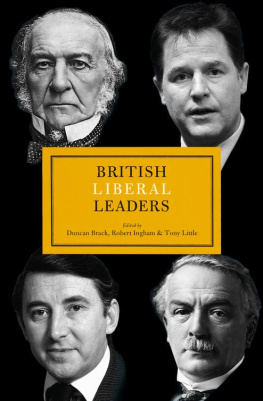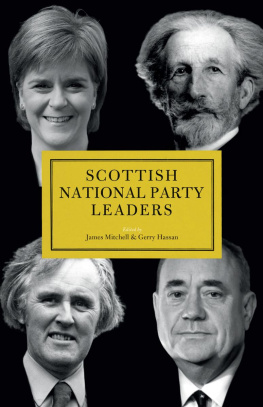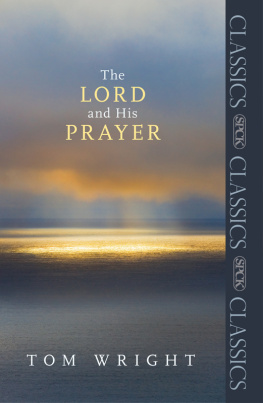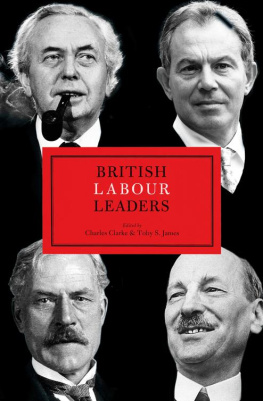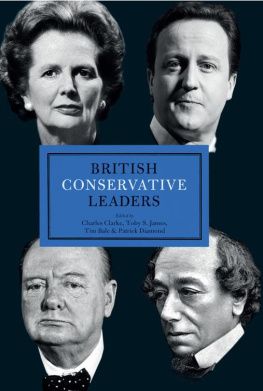T his book is the sixth in the series of Liberal history source books produced by the Liberal Democrat History Group; the others are Dictionary of Liberal Biography (1998), Dictionary of Liberal Quotations (1999, revised edition 2013), Great Liberal Speeches (2001), Dictionary of Liberal Thought (2007) and Peace, Reform and Liberation: A History of Liberal Politics in Britain 16792011 (2011).
Given the critical importance of party leadership in British politics, for some time we had thought that an analysis of Liberal leaders and their strengths and weaknesses would provide a valuable addition to this range; we developed a set of criteria against which to measure their effectiveness (summarised in Chapter 1) and commissioned authors to write chapters on individual leaders. Completely separately, Charles Clarke, Toby James and colleagues began their studies of Conservative and Labour leaders, and in due course Biteback Publishing decided to publish all three books as a set.
Leaders in the other two books were assessed by slightly different criteria, so the first three chapters in this book present three contrasting ways of judging Liberal leaders. There is of course no single way of doing this, and we hope that this book will contribute to a debate about the characteristics of effective political party leadership in general, and Liberal leadership in particular.
After the three introductory chapters, the next twenty-four cover every leader of the Liberal Party, SDP and Liberal Democrats from Lord Grey in 1828 to Nick Cleggs resignation in 2015. Lord Hartington and Lord Granville, who led the Liberals in the Commons and Lords during Gladstones first retirement in 187580, are given a joint chapter. As in the other two books, the authors we approached are, in general, admirers of the leaders they have written about, but we asked them to assess their subjects objectively against the criteria we provided. For readers interested in learning more about particular individuals, we have included a list of further reading. (The book does not include the leaders of the various Liberal breakaway factions the Liberal Unionists of 18861912 and the Liberal Nationals of 193147.)
The final three chapters are transcripts of interviews with three Liberal and Liberal Democrat leaders David Steel, Paddy Ashdown and Nick Clegg on the general topic of Liberal leadership and their particular experiences of it.
The support and encouragement of the History Groups executive has been vital to the successful completion of this book, and we place on record our thanks to them. We have enjoyed cooperating with Charles Clarke and Toby James in aligning our book with theirs, and thank them for their chapters. We thank David Steel, Paddy Ashdown and Nick Clegg for their interviews, and Sophie Moxon and Esperanza Galera Suarez, at the University of East Anglia, for excellent transcriptions of the recordings. Melissa Bond, Olivia Beattie and Iain Dale at Biteback Publishing have been consistently encouraging and patient. Above all, the authors of the chapters on the leaders have written, and in many cases rewritten, their chapters to a high quality and to tight deadlines. Our warmest thanks go to them all.
Duncan Brack, Robert Ingham and Tony Little
July 2015
PETER BARBERIS is emeritus professor at Manchester Metropolitan University. He has written extensively on British government and politics and is the author of Liberal Lion Jo Grimond: A Political Life (2005). He is a fellow of the Royal Historical Society and of the Joint University Council.
CHRIS BOWERS is a freelance writer and broadcaster on sport and current affairs. His Nick Clegg: The Biography was published by Biteback Publishing in 2011 (paperback update 2012), and among his other books is The Sporting Statesman (2014), about how the tennis champion Novak Djokovic is rehabilitating the reputation of Serbia.
DUNCAN BRACK is the editor of the Journal of Liberal History, and has co-edited and contributed to all the Liberal Democrat History Groups previous books. He has been director of policy for the Liberal Democrats, chair of the partys conference committee, and special advisor to Chris Huhne MP, Secretary of State for Energy and Climate Change. He is currently vice-chair of the partys Federal Policy Committee.
DAVID BROWN is professor of modern history at the University of Southampton. He has published widely on nineteenth-century British history, and his books include Palmerston: A Biography (2010) and Palmerston and the Politics of Foreign Policy, 184655 (2002).
JIM BULLER is a senior lecturer in politics at the University of York. He has a PhD from the University of Sheffield and has previously worked in the department of political science and international studies at the University of Birmingham. He has written widely on the subject of British politics and public policy, including recent articles in the New Political Economy, British Journal of Politics and International Relations, West European Politics, Contemporary European Politics and British Politics. He has recently co-edited a special issue of Parliamentary Affairs on Assessing Political Leadership in Context British Party Leadership During Austerity. He is also chair of the PSA Anti-Politics and Depoliticisation Specialist Group.
JOHN CAMPBELL is a freelance political biographer. His books have included Lloyd George: The Goat in the Wilderness (1977), Nye Bevan and the Mirage of British Socialism (1986), Edward Heath (1993, NCR Prize 1994), Margaret Thatcher: The Grocers Daughter (2000), The Iron Lady (2003), and, most recently, Roy Jenkins: A Well-Rounded Life (2014), which was shortlisted for the Samuel Johnson and Costa book prizes and won the Paddy Power Political Biography award for 2015.
CHARLES CLARKE was Member of Parliament for Norwich South from 1997 to 2010. He served as Education Minister from 1998 and then in the Home Office from 1999 to 2001. He then joined the Cabinet as Minister without Portfolio and Labour Party chair. From 2002 to 2004, he was Secretary of State for Education and Skills, and then Home Secretary until 2006. Charles was previously chief of staff to Leader of the Opposition Neil Kinnock. He now holds visiting professorships at the University of East Anglia, Lancaster University and Kings College London, and works with educational organisations internationally. He edited The Too Difficult Box and co-edited British Labour Leaders and British Conservative Leaders.
MATT COLE is a teaching fellow in history at the University of Birmingham. He is the author of Richard Wainwright, the Liberals and Liberal Democrats: Unfinished Business (2011) and worked in the SDPs general election unit in 1987.
DAVID DUTTON taught at the University of Liverpool for thirty-five years before retiring in 2010 as Ramsay Muir professor of modern history. His books include A History of the Liberal Party since 1900 (2013) and Liberals in Schism: A History of the National Liberal Party (2008).
DR RICHARD A. GAUNT is associate professor in British history at the University of Nottingham. He is the author of Sir Robert Peel: The Life and Legacy (2010) and the editor of Peel in Caricature: The Political Sketches of John Doyle (HB) (2014).
DAVID HOWARTH is professor of law and public policy at the University of Cambridge, where he also directs the MPhil in public policy. From 200510, he was the Member of Parliament for Cambridge, serving in the Liberal Democrat shadow Cabinet as shadow Secretary of State for Justice. Before that he was leader of Cambridge city council. His research mainly concerns the relationship between law and politics and the design of legal institutions, but he also writes occasionally on Liberal and Liberal Democrat history.

